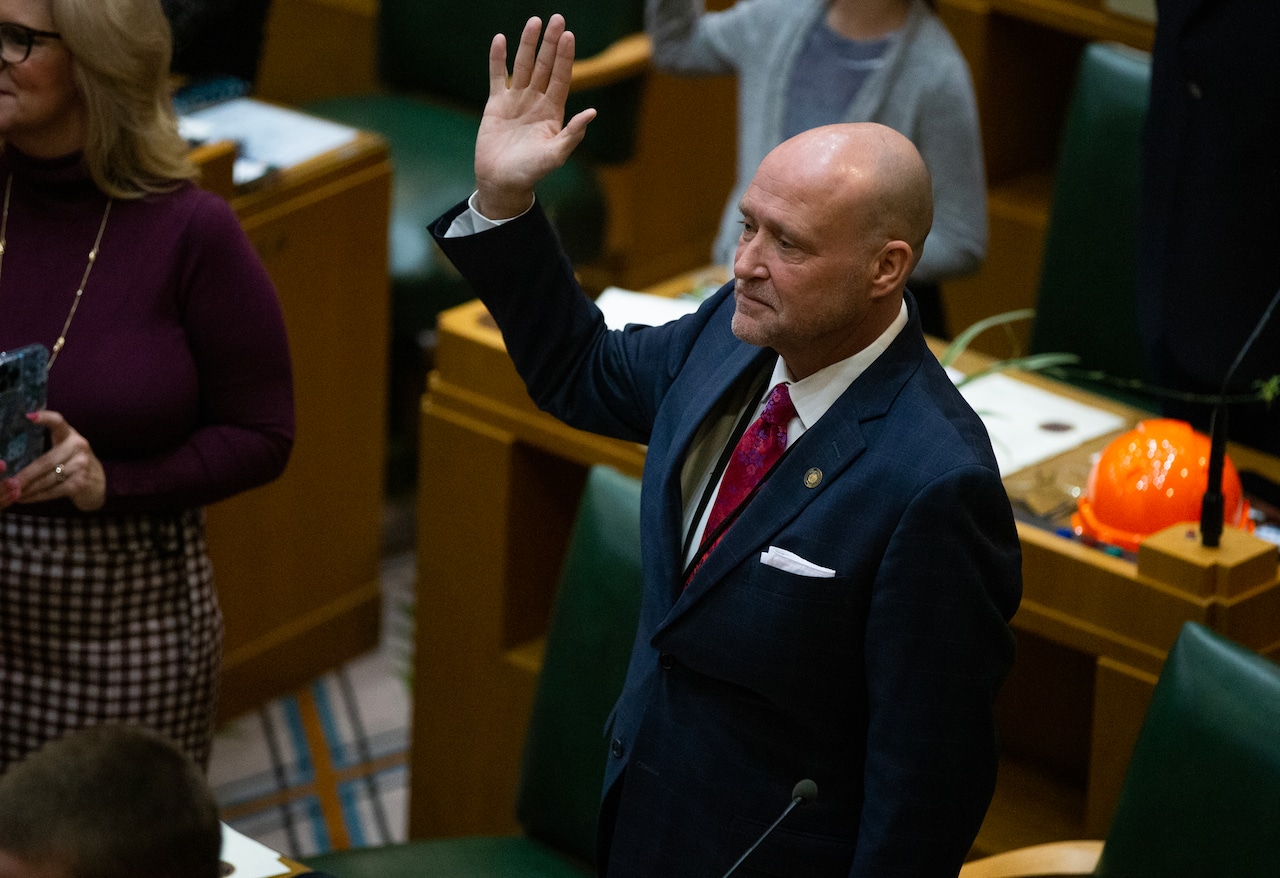Copyright The Oregonian

The directors of a tiny Northeast Oregon nonprofit called Inland Development Corp. voted in 2017 to cut a $145,000 check to another nonprofit, Morrow Development Corp., where state Rep. Greg Smith moonlighted as a contract employee. Immediately afterward, Inland named Smith and two others to its board of directors. They replaced three board members who resigned at that meeting. Then, later that month, Smith and the rest of Inland’s board met again to entertain an offer to buy the nonprofit’s most valuable asset, a fiber-optic provider called Windwave Communications. It was enjoying a booming business serving Amazon data centers near the small city of Boardman. Windwave’s would-be buyers? A cadre of Inland insiders, including the three men who had just resigned from the nonprofit’s board. Months later, amid mounting pressure from the buyers’ group who appointed them to the board, Smith and Inland’s other two new directors OK’d the deal. The sequence of events is laid out in documents obtained by state attorneys investigating the sale. In July, the Oregon Department of Justice filed civil charges against Smith and seven others involved in the sale. State attorneys say Inland’s board sold Windwave for a quarter of its real value. They contend the 2018 deal failed to account for the value of Windwave’s new Amazon contracts, and the resulting lowball sales price created a windfall worth several million dollars to the insiders who bought the company. Minutes from Inland’s 2017 board meetings are among a trove of investigatory documents obtained by The Oregonian/OregonLive in a public records request to state attorneys. These records shed new light on the tight connections between Inland’s board and Windwave’s suitors. They facilitated their deal, records show, by choosing the people who would vote on it. They discussed shredding a legal opinion of the transaction if it was unfavorable, and they rebuffed their lawyers’ suggestion that they seek an independent review of their plans. “I would hope that most folks on boards would not treat the assets of the organizations they serve as something that could benefit them somehow,” said Professor Dyana Mason, who studies nonprofit management at the University of Oregon. She said there are many potential conflicts of interest in the Windwave case, raising the possibility of “self-dealing behavior.” Even Inland board members who weren’t buying a piece of Windwave had a responsibility to thoroughly vet the deal being proposed by those who appointed them to Inland’s board, Mason said. It will be up to the courts to determine whether the defendants broke the law, she added, but many of their actions raise concerns. “It’s a mess,” Mason said. “It’s an ethical mess, for sure.” Data center imbroglio Morrow County leaders established Inland in 2004 as a nonprofit dedicated to bringing internet service to government offices, hospitals, schools and other agencies in Morrow County. Windwave emerged later, a for-profit companion that provided telecom services to local businesses. The state began its three-year investigation into the complex Windwave transaction following a 2022 article in The Oregonian/OregonLive. The article exposed the deal by local officials in Morrow County, a community of a little more than 12,000 residents about 160 miles east of Portland, and raised questions about the price they paid to buy Windwave. >>Windwave: Here are the defendants The newsroom’s investigation showed that buyers calculated Windwave’s sale price based on old financial data, which didn’t account for a huge boost in revenue at the fiber-optic business in 2016 and 2017. After the deal closed, some of Windwave’s buyers voted to extend tax breaks to Amazon worth hundreds of millions of dollars, even though — as Windwave’s new owners — they stood to benefit personally from the tech giant’s growing need for local fiber-optic connectivity. Following the news organization’s reporting, three of Windwave’s buyers — elected officials in Morrow County or the Port of Morrow — agreed to pay $2,000 apiece after the Oregon Government Ethics Commission concluded they had failed to properly disclose how the votes could benefit them. The state says the statute of limitations for criminal charges in the case expired two years ago. But the Department of Justice filed civil charges in July against the Inland board members who approved Windwave’s sale, and the former board members who bought Windwave. Prosecutors claim they breached their fiduciary duty to the charity by selling the fiber-optic business for far less than it was worth. The state is seeking to compel Windwave’s owners and others involved in the deal to pay back nearly $7 million, plus potential punitive damages, or possibly to unwind the deal and return Windwave to Inland. The defendants say a two-year civil statute of limitations prevents the state from acting now, and that the conduct alleged doesn’t clear the “high statutory bar” for showing gross negligence or intentional misconduct. And they argue that the Department of Justice, which declined to object to Windwave’s sale in 2018, should have been able to anticipate the fiber-optic business would benefit from Amazon’s local data centers — even though the defendants now admit they didn’t tell the state Amazon was Windwave’s biggest customer. >>Windwave: A timeline of the case During the state’s investigation, Inland, Windwave and some of the officials involved turned over documents related to the transaction from 2017 and 2018. The Oregonian/OregonLive obtained some of these records through a public records request to the Department of Justice. Windwave recently sued the Department of Justice to prevent the state from disclosing other records to The Oregonian/OregonLive, including details of the company’s business with Amazon. That case is pending. What the records show Records released to the newsroom show how Windwave’s buyers maneuvered to purchase the fiber-optic company and the ways in which their board responsibilities to the nonprofit may have run up against their personal business interests. Board members planned the deal from the inside: All five of Windwave’s buyers served on Inland’s board for several months before the deal and formed plans to buy the fiber-optic provider from their own organization during that time. Inland’s publicly available tax records don’t show that they all served on the board. But board minutes and emails among the buyers show that all five were Inland board members even as they hired attorneys and a valuation firm to facilitate the deal. They also chose three new board members who would later vote on Windwave’s sale. Buyers offered differing rationales for restructuring the board: Three of Windwave’s buyers resigned from Inland’s board at a meeting on Sept. 5, 2017, according to board minutes, immediately after approving the $145,000 donation to the nonprofit where Rep. Smith worked. The minutes stated that they resigned so the board would have “a wider background and a little broader geographic diversity.” But in a declaration under oath filed this month, Don Russell — a former Morrow County commissioner, and one of Windwave’s buyers — offered a different rationale. He said they quit because “it was not appropriate for the individuals who were intending to purchase Windwave to approve the sale on Inland’s behalf.” The practical effect of the resignations was that the two prospective buyers who remained on Inland’s board could recuse themselves from the vote, which they did, and Russell said the five-member board still had “three independent board members” — chosen by the buyers — available to approve the deal. Buyers avoided a ‘fairness opinion’: The buyers’ attorney recommended they solicit a “fairness opinion” to ensure Inland’s board was doing its due diligence about the transaction. But Jerry Healy, one of the buyers, told the attorney his group didn’t want to take a potentially expensive step if it delayed the deal. “I told him I was not interested in 6 months and $50K,” Healy wrote to two other buyers in August 2017, when all three were still on Inland’s board. “I told him the buyer’s group has financing lined up (and) would like to see this completed by end of year.” Buyers discouraged rival bids or an open sale: On the open market, Windwave might attract other bidders and perhaps a higher price. In an email thread among his partners pursuing Windwave, Healy wrote to the other investors and urged them to come up with an explanation for why Inland would sell Windwave to them and not consider outside bids. The justification they settled on, the emails show, was that the inside buyers would maintain local jobs and preserve Inland’s mission of providing internet service to local clients in remote areas – terms they suggested no national provider would agree to. Shredding the document? Healy also wrote that Smith had suggested they meet with legislative counsel for a “free opinion about this transaction. Greg says if we do not like (the) opinion we shred it, goes no further.” It’s not clear from the records if they ultimately sought an opinion on the deal from legislative counsel, and if they did whether they actually shredded it. An attorney representing Smith denied that Smith made the suggestion Healy attributed to him. Oregon’s legislative counsel’s office did not respond to an inquiry about whether it offered an opinion on the transaction. Buyers pressured the new board they’d installed: Several months into their tenure, the new board still hadn’t signed off on Windwave’s sale, frustrating the buyers. Healy wrote to other buyers that their attorneys were concerned that two of the three independent board members outside the buyer’s group didn’t appear to be giving it adequate attention. He indicated that businessman Rich Devin didn’t attend a key board meeting and that Smith, the state lawmaker, seemed disinterested. “I believe Rich and Greg have already dealt with this more than they committed for and attendance will probably only get worse,” Healy wrote. He later noted that delays in closing the deal “already cost us 2017 net profits of ($)1,500,000.” In January 2018, the buyers issued an ultimatum to the board. “Weary of the elapsed time and expense of negotiation,” their attorney wrote, they threatened to withdraw their offer unless the board met their demands within 10 days. Inland’s board ultimately signed off on the deal. In the final sale agreement, Inland and Windwave agreed not to notify customers about the sale of the fiber-optic business, disclose the deal publicly or issue a press release about it. ‘It did not occur to me’ Along with his work at nonprofits in eastern Oregon, Smith has spent nearly a quarter century in the Oregon Legislature. The Republican from the tiny community of Heppner has faced mounting questions in recent years about ethical conflicts between that role and his day job as an economic consultant. Yet he professed astonishment last summer when the Oregon Department of Justice named him among the defendants in the Windwave case. In his Facebook note to Morrow County constituents, Smith said he voted for Windwave’s sale because he thought the sale proceeds would benefit educational organizations that Inland served; because the Oregon Department of Justice didn’t initially object to the deal; and, because outside appraisers — a Portland firm called Cogence Group, hired by the Windwave buyers group — had helped set the sale price. Cogence did not respond to an inquiry about whether it stands by its Windwave valuation. “It did not occur to me to ponder if anyone was being deceitful or untruthful. I still do not believe anyone was,” wrote Smith. He said he didn’t benefit financially from the transaction in any way and condemned the civil charges against him and the two other Inland board members who didn’t have a stake in Windwave. “Inland Development has never given me so much as a ham sandwich,” Smith said. Smith did not respond to the newsroom’s emailed questions about whether he believed Windwave’s buyers expected him to vote in favor of the sale after they’d contributed $145,000 to Morrow Development — where he worked part time as a contractor and had the contract administering the nonprofit’s loans. (Healy also served on Morrow Development’s board, and records show Morrow Development had previously loaned Windwave at least $750,000.) Nor did Smith say whether he knew other board members were planning to buy Windwave when they appointed him to Inland’s board. Smith and his attorney did say that a Morrow Development audit categorizes the $145,000 contribution from Inland as “a reimbursement” that was directed to a portion of Morrow Development’s work that was separate from the loan portfolio program managed by Smith’s consulting firm. It’s unclear what the reimbursement would have been for. Smith’s attorney did not respond to a request for a copy of the audit. Contemporaneous minutes from Inland’s board meeting describe the $145,000 as a “donation,” intended to “assist Morrow Development to further their work in business/job creation in Morrow County.” The state’s complaint isn’t the only ethical and legal issue Smith faces. The state ethics commission is investigating whether he abused his position as director of the Columbia Development Authority, a small public agency in eastern Oregon, to raise his own pay. A preliminary inquiry by commission staff found reason to believe Smith was paid for work he didn’t do at the agency, received a pay hike that hadn’t been negotiated by the agency’s board, and may have used the agency’s resources for his own business. The U.S. Department of Defense terminated its contract with the agency after the Malheur Enterprise newspaper raised questions about Smith’s raise, which increased his annual pay from $129,000 to $195,000. ‘Don’t sell stuff to yourself’ The other defendants and their attorneys haven’t responded to questions about the Windwave deal or specific inquiries about the documents released to the newsroom. In September, though, in a declaration that accompanied the motion to dismiss the state’s case, Inland board President Jill Parker said Windwave’s sale generated cash that enabled the nonprofit to continue its philanthropy providing internet service in Morrow County. Selling to local investors helped ensure local jobs, she said, because the buyers were committed to eastern Oregon. “My own conclusion was the sales price was fair and that this sale was in the region’s best interest,” Parker wrote. Jim White, executive director of the Nonprofit Association of Oregon, said it’s very unusual for a nonprofit to sell assets to its own directors. In such cases, he said board members must take special care to ensure board members with a personal stake aren’t participating in the conversations around that decision. “If there are members of the board who have an interest in that disposal, directly benefiting themselves, they are in a direct conflict of interest,” White said. “They should be excusing them from any conversation about whether it is in the best interest of the organization to dispose of that asset.” While declining to comment on the specifics of Windwave’s sale, White said nonprofits generally shouldn’t sell valuable parts of their organization without soliciting multiple bids. They should always seek the best price to support their charitable mission and put that public good ahead of any personal considerations. “Don’t sell stuff to yourself. Don’t, in your volunteer role on a board, sell stuff to the company that you are running in your day work,” White said. “That’s just basic separation.”



